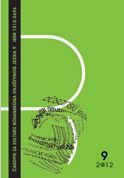ŽENSKO PISMO I DE/KONSTRUKCIJA NARATIVNOG IDENTITETA U ROMANU „ŽENE. GLASOVI“ JASMINE MUSABEGOVIĆ
WOMAN'S WRITING AND THE DE/CONSTRUCTION OF THE NARRATIVE IDENTITY IN NOVEL „WOMEN. VOICES“ BY JASMINA MUSABEGOVIĆ
Author(s): Erna MurićSubject(s): Literary Texts
Published by: Filozofski fakultet Univerziteta u Tuzli
Keywords: women's writing; narrative identity; the poetics of testimony
Summary/Abstract: The interpretation of the novels written by Jasmina Musabegovic through the concepts of women's writing is focused on the ways of constructing narative identities from women's perspectives and experience, and on differences, alternations, stereotypology and subversion in relation to the dominant symbolic references: tradition, family, language and culture. Literary and stylistic values as much as the unique values of author's novels in literary-critical reception are not interpreted as a strategy of 'writing in' the corporality into the body of the text nor as a posibility of conceptualizing women's writing. This thesis tends to elaborate women's perspective as a minority discourse written from the position of a witness while, simultaneously, opening the issues and problems of negotiating individual and social identity. Poetic frames of self-interpretation of female subject in the process and the experience of war are exposed as a fundamental intersections in which women's text establishes the economy of respecting the other and anti-war po/etic(s) in contrast to the 'identities that kill' and the culture of violence and death. Considering the basic theoretical and methodological premises of feministic and poststructuralistic critique, as well as Ricoueur's hermeneutics of self-being, 'reading out' the narative identities in the novels by Jasmina Musabegovic will result in confirming the thesis that the female subjects experience multiple variations of identity within the story, issuing that the acknowledgement of difference and the other is the main ethical condition without whom the story would not be possible. Last published, novel „Žene. Glasovi“ is a specific text which, in the context of the anti-war letters and poetic subversion of post / Bosnian war literature, wants to be a woman's witness of the war. Diffuse structure of this novel is realized by many votes as the flow of witnesses and victims of war who possess narrator's letter to the terms of trauma memories and play a major role in the apocalyptic scenario of this novel.
Journal: Bosanski jezik
- Issue Year: 2012
- Issue No: 09
- Page Range: 153-164
- Page Count: 12
- Language: Bosnian

